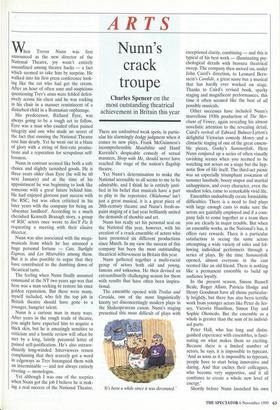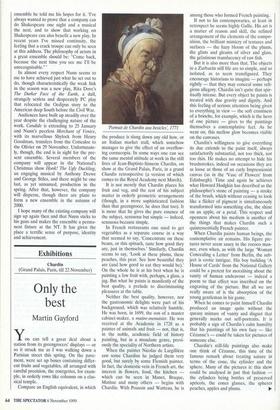ARTS
Nunn's crack troupe
Charles Spencer on the most outstanding theatrical achievement in Britain this year Wen Trevor Nunn was first announced as the new director of the National Theatre, joy wasn't entirely unconfined among theatre hacks — a fact which seemed to take him by surprise. He walked into his first press conference look- ing like the cat who had got the cream. After an hour of often sour and suspicious questioning Trev's arms were folded defen- sively across his chest and he was rocking in his chair in a manner reminiscent of a disturbed child in a Romanian orphanage.
His predecessor, Richard Eyre, was always going to be a tough act to follow. Eyre was a man who exuded often pained integrity and one who made no secret of the fact that running the National Theatre cost him dearly. Yet he went out in a blaze of glory with a string of first-rate produc- tions and a reputation for scrupulous self- lessness.
Nunn in contrast seemed like both a safe choice and slightly tarnished goods. He is three years older than Eyre (he will be 60 next January) and at the time of his appointment he was beginning to look like someone with a great future behind him. He had enjoyed glorious past success with the RSC, but was often criticised in his later years with the company for being an 'absentee landlord'. According to a much cherished Kenneth Branagh story, a group of RSC actors once wrote to Jim'll Fix It requesting a meeting with their elusive director.
Nunn was also associated with the mega- musicals from which he has amassed a huge personal fortune — Cats, Starlight Express, and Les Misembles among them. But it is also possible to argue that they have contributed to the dumbing down of theatrical taste.
The feeling when Nunn finally assumed command at the NT two years ago was that here was a man seeking to restore his once golden reputation. But there were many, myself included, who felt the top job in British theatre should have gone to a younger, hungrier talent.
Nunn is a curious man in many ways. After years in the rough trade of theatre, you might have expected him to acquire a thick skin, but he is amazingly sensitive to criticism and a hostile review will often be met by a long, faintly paranoid letter of pained self-justification. He's also extraor- dinarily long-winded. Interviewers return complaining that they scarcely got a word in edgeways as Trey harangued them with an interminable — and not always entirely riveting — monologue.
Yet although I was one of the sceptics when Nunn got the job I believe he is mak- ing a real success of the National Theatre. There are undoubted weak spots, in partic- ular his alarmingly dodgy judgment when it comes to new plays. Frank McGuimiess's incomprehensible Mutabilitie and Hanif Kureishi's despicable comedy of sexual manners, Sleep with Me, should never have reached the stage of the nation's flagship theatre.
Yet Nunn's determination to make the National accessible to all seems to me to be admirable, and I think he is entirely justi- fied in his belief that musicals have a part to play in the repertoire. Oklahoma! isn't just a great musical, it is a great piece of 20th-century theatre and Nunn's fresh-as- paint staging of it last year brilliantly united the demands of showbiz and art.
Nunn has really set his personal seal on the National this year, however, with his creation of a crack ensemble of actors who have presented six different productions since March. In my view the success of this company has been the most outstanding theatrical achievement in Britain this year.
Nunn gathered together a multi-racial group of actors both old and young, famous and unknown. He then devised an extraordinarily challenging season for them with results that have often been inspira- tional.
The ensemble opened with Troilus and Cressida, one of the most linguistically knotty yet disconcertingly modern plays in the Shakespearean canon. Nunn's staging presented this most difficult of plays with
'It's been a while since it was decorated.' exceptional clarity, combining — and this is typical of his best work — illuminating psy- chological details with bravura theatrical sweep. The company then moved on, under John Caird's direction, to Leonard Bern- stein's Candide, a great score but a musical that has hardly ever worked on stage. Thanks to Caird's revised book, sparky staging and magnificent performances, this time it often seemed like the best of all possible musicals.
Other successes have included Nunn's marvellous 1930s production of The Mer- chant of Venice, again revealing his almost novelistic attention to the revealing detail, Caird's revival of Edward Bulwer-Lytton's delightful Victorian comedy Money and a climactic staging of one of the great ensem- ble pieces, Gorky's Summetfolk. Here Nunn conjured up a series of often visually ravishing scenes when you seemed to be watching not actors on a stage but the hyp- notic flow of life itself. The third-act picnic was an especially triumphant evocation of summer lassitude, boozy stupor and marital unhappiness, and every character, even the smallest roles, came to remarkably vivid life.
Ensembles undoubtedly create formidable difficulties. There is a need to find plays with large enough casts to make sure the actors are gainfully employed and if a com- pany fails to come together as a team then you are clearly in major trouble. But when an ensemble works, as the National's has, it offers rare rewards. There is a particular satisfaction in seeing the same actors attempting a wide variety of roles and fol- lowing individual performers through a series of plays. By the time Summerfolk opened, almost everyone in the cast seemed like an old friend. There is nothing like a permanent ensemble to build up audience loyalty.
In the present season, Simon Russell Beale, Roger Allam, Patricia Hodge and Henry Goodman have all shone particular- ly brightly, but there has also been terrific work from younger actors like Peter de Jer- sey, Victoria Hamilton, Simon Day and Sophie Okonedo. But the ensemble as a whole is greater than the sum of its individ- ual parts.
Peter Hall, who has long and distin- guished experience with ensembles, is fasci-
nating on what makes them so exciting.
Because there is a limited number of actors, he says, it is impossible to typecast.
'And as soon as it is impossible to typecast, people have to start being innovative and daring. And that excites their colleagues, who become very supportive, and it all combines to create a whole new level of energy.'
Shortly before Nunn launched his own ensemble he told me his hopes for it. 'I've always wanted to prove that a company can do Shakespeare one night and a musical the next, and to show that working on Shakespeare can also benefit a new play. In recent years I've missed continuity, the feeling that a crack troupe can only be seen at this address. The philosophy of actors in a great ensemble should be: "Come back, because the next time you see me I'll be unrecognisable."'
In almost every respect Nunn seems to me to have achieved just what he set out to do, though characteristically the weak link in the season was a new play, Rita Dove's The Darker Face of the Earth, a dull, strangely sexless and desperately PC play that relocated the Oedipus story to the American deep South before the Civil War.
Audiences have built up steadily over the year despite the challenging nature of the work. Candide is extending to 25 January and Nunn's peerless Merchant of Venice, with its marvellous Shylock from Henry Goodman, transfers from the Cottesloe to the Olivier on 29 November. Unfortunate- ly, though, the end is in sight for the pre- sent ensemble. Several members of the company will appear in the National's Christmas show Honk! The Ugly Duckling, an engaging musical by Anthony Drewe and George Stiles, and there might be one last, as yet unnamed, production in the spring. After that, however, the company will disperse, though there are plans to form a new ensemble in the autumn of 2000.
I hope many of the existing company will sign up again then and that Nunn sticks to his guns and makes the ensemble a perma- nent fixture at the NT. It has given the place a terrific sense of purpose, identity and achievement.



























































































 Previous page
Previous page